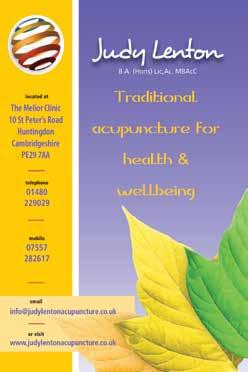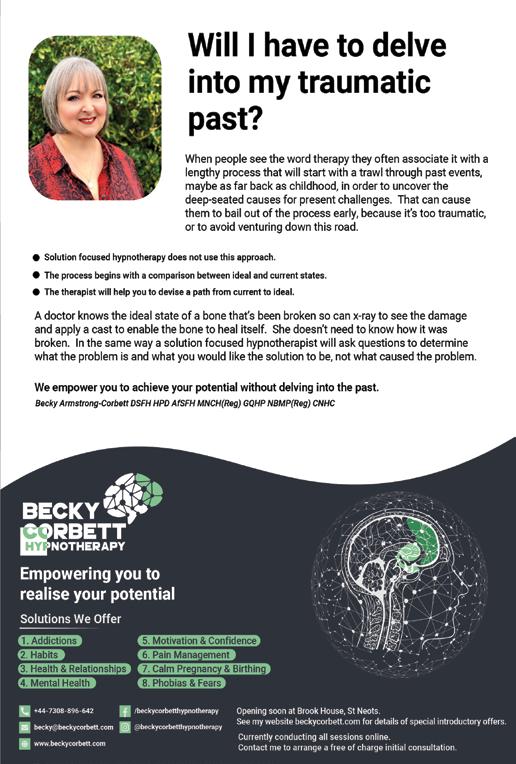
4 minute read
Back to School
from Cambs Sept 2020
by Villager Mag

Many children are going back to school in September, some for the first time in months, and it’s natural for them to feel a bit anxious about starting a new school year.
Advertisement
Prepare your child
If your child hasn’t gone back to school yet, find out what will be different compared to before the pandemic. Explain to your child what to expect. Younger children may benefit from acting out some things at home, such as keeping their distance when queueing. Clinical psychologist Dr Emma Millar recommends asking if the school can “take pictures or videos of the changes so your child knows what to expect, as that will aid the transition process.”
Talk to your child
It’s important children know they can talk to you about their concerns. Some like to have your full attention while others prefer it when they don’t need to make eye contact, such as when you’re driving or cooking. Recognise that you can’t ‘solve’ their concerns, but you can discuss coping strategies. If your child doesn’t want to talk, try reading together and talking about how the character feels in different situations.
Encourage excitement
Don’t forget to talk about the positives of returning to school, such as seeing friends and playtime. Dr Emma Millar says, “Discuss what they’re excited about. Children pick up on how we’re feeling, so if you remain calm and positive about them returning back to school, then that will really help them to feel reassured.”
Get back into a routine
Most children prefer some level of routine. Your child may have been going to bed later recently, not showering as often and having more screen time. Help them adjust to a more structured routine over a couple of weeks.
Make sure they get enough sleep
Work towards returning children to an earlier bedtime, including at weekends. Children need more sleep than adults – six to thirteen year olds can need up to eleven hours of sleep a night.
Mindfulness and meditation
Mindfulness and meditation can help children and adults to feel calmer and more in control. Older children might benefit from Headspace’s guided meditations. For younger children, try the ‘Sitting Still Like a Frog’ book and CD by Eline Snel.
More information
‘Helping your Child with Fears and Worries’ by Cathy Creswell and Lucy Willetts is worth reading. The book is packed with practical advice on helping children to deal with fears, worries and anxiety, and isn’t written like a medical textbook! The following websites have useful resources: • www.camhs-resources.co.uk • www.youngminds.org.uk/blog/supporting-a-childreturning-to-school-after-lockdown
Extra support
All children feel anxious and worried sometimes. However, up to 15% of children experience anxiety disorders, which can stop them enjoying day-to-day life and lead to more long-term issues. So don’t be afraid to ask for help: your child’s school may be able to offer advice, or your GP may be able to refer them for extra support. By Kate Duggan 17
FOR WELL-BEING

Judy obtained her Licentiate in Acupuncture, and B.A (Hons) degree in Traditional Acupuncture, from the College of Traditional Acupuncture, Warwickshire. Judy is a passionate believer in the positive benefits, on both physical and emotional levels, that may be obtained from receiving acupuncture treatment. Acupuncture originated in China and other far eastern cultures where it still features in mainstream healthcare, both as a stand-alone therapy and in combination with conventional western medicine. Judy has been trained as a classical Five Element Acupuncturist; treatment is aimed at the root cause of your condition as well as your main symptoms. This approach helps with resolving your problem and enhancing your feelings of wellbeing. You may notice other niggling problems resolve as your main health complaint improves. Judy continues to pursue her belief in excellence of care for her patients in her role as a dedicated acupuncture practitioner, and is a member of the British Acupuncture Council. Please contact Judy for a free 20 minute consultation to discuss how acupuncture treatment can help you.


Jill Dighton
MA Counselling & Psychotherapy Practice BSc (Hons) Integrative Counselling MBACP (Accred)., UKCP Reg.
Counselling Service Depressed? Anxious? Relationship Issues? Low Self Esteem?

Have you considered Counselling sessions? Based in Grafham village, I offer a professionally qualified Counselling Service to individuals and couples in a secure, confidential & non-judgemental atmosphere. Ample parking. Concessionary rates available.
For further details: Tel: 07925 852 985 (Dedicated line with voicemail) Email: jill@jdighton.co.uk or visit
www.jilldightoncounselling.co.uk










